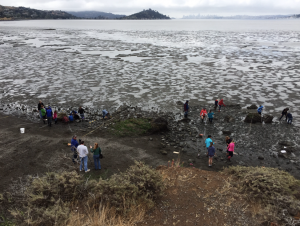Marin Community Foundation Advancing Nature-Based Adaptation Solutions Grant Program
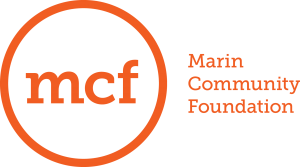 The California State Coastal Conservancy and the Marin Community Foundation are supporting a series of innovative projects that are developing and testing nature-based solutions to protect shorelines and adapt to sea level rise in Marin County. These grants are made possible by funding from the Buck Family Fund of the Marin Community Foundation to address the impacts of climate change, particularly on low-income communities and other underserved populations in Marin County.
The California State Coastal Conservancy and the Marin Community Foundation are supporting a series of innovative projects that are developing and testing nature-based solutions to protect shorelines and adapt to sea level rise in Marin County. These grants are made possible by funding from the Buck Family Fund of the Marin Community Foundation to address the impacts of climate change, particularly on low-income communities and other underserved populations in Marin County.
Living Shorelines and other nature-based approaches utilize nature to create a living shoreline edge. By restoring and enhancing naturally occurring shoreline features, these projects are designing and testing sustainable defenses against sea level rise, as one of many approaches to protect some of Marin’s most underserved and vulnerable regions.
The Advancing Nature-Based Adaptation Solutions grant program seeks to support planning, design, permitting, implementation, education, and/or community-based restoration activities to address the risks and impacts of climate change and sea level rise; and to further advance nature-based adaptation solutions to protect and enhance the Marin County bay shoreline and outer coast. These funds can be used to support the following types of projects:
- Small to moderate size, high-priority restoration projects located within Marin County that advance regional coastal and baylands ecosystem habitat goals, particularly ‘living shoreline’ concepts, including restoring native oyster and eelgrass habitats, sand beaches and dunes, tidal marshes, and other shoreline habitats;
- Education and engagement of the public, especially underserved youth and communities more directly impacted by sea level rise, in restoration efforts, where possible;
- Capacity building among critical partners in order to translate scientific data and analysis into practical solutions for broader implementation.
Questions about the application process and potential projects may be directed to Marilyn Latta, 510-286-4157 or email.
In Year One of this program, the following grants were awarded:
Grant Recipient: Marin Audubon Society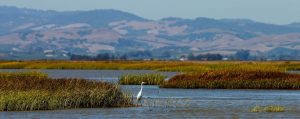
Project: Tiscornia Marsh Habitat Restoration and Sea Level Rise Adaptation Project
Grant Amount: $195,000
This project seeks to address potential flooding and habitat degradation along the shoreline of San Rafael’s Canal Area, focusing on a property owned by the Marin Audubon Society. The project will develop a preliminary engineering design to raise and improve a section of degraded levee and to stabilize and restore, if possible, an eroding tidal marsh to provide habitat and reduce the vulnerability of the community to rising tides and flooding. In addition, the project will educate the community about the potential impacts of sea level rise and involve residents in adaptation planning and implementation of solutions. The grant includes youth and community outreach and involvement led by ShoreUp Marin.
Contact: Barbara Salzman, Marin Audubon Society,
Grant Recipient: Point Blue Conservation Science
Project: A Framework for Prioritizing Adaptation Strategies
Grant Amount: $203,000
Point Blue will work with the San Francisco Estuary Institute and the County of Marin’s Community Development Agency to develop a framework to identify, evaluate and prioritize nature-based climate change adaptation strategies to maximize benefits to the public and ecosystem using the best available science. The project team will use the adaptation phase of the County’s BayWAVE project as a test case with the intent that the framework developed will also be applicable around the entire bay and beyond. Naturebased strategies are innovative adaptation solutions that provide more than just coastal protection benefits. Understanding the broader suite of benefits and assessing trade-offs that go beyond the cost of construction for different adaptation strategies is a critical need in transitioning from community vulnerability assessment to action.
Contact: Sam Veloz, Point Blue Conservation Science
Grant Recipient: San Francisco State University Romberg Tiburon Center for Environmental Studies
Project: New Life for Eroding Shorelines: Designing natural shoreline edges with coarse grained beach treatments and plant enhancements for high tide refuge
Grant Amount: $200,000
This project seeks to test methods for sustaining high marsh habitat in the face of sea level rise with two goals: 1) to increase high tide refuge for wildlife by manipulating salt marsh vegetation along shorelines and channels at two sites (Corte Madera Ecological Reserve and Blackie’s Pasture in Tiburon), and 2) to develop conceptual designs for shoreline treatments at both sites that can sustain high marsh habitats during accelerated sea level rise. The project will also involve a focus on engaging and educating community members from underserved communities in Marin County. The grant includes youth and community outreach and involvement components led by Richardson Bay Audubon Center.
Contact: Kathy Boyer, SFSU Romberg Tiburon Center
Grant Recipient: Smithsonian Environmental Research Center
Project: Community-based Research for Living Shorelines Design
Grant Amount: $152,000
This project will engage Marin County teachers, students, youth leaders and other community members in science-based approaches to climate adaptation. Through teacher workshops, youth internships and volunteer workdays, community scientists will work with professional researchers on rigorous scientific studies at 10 sites in Richardson Bay aimed at finding solutions to challenges facing native oyster restoration and living shoreline projects. The grant includes teacher training led by the San Francisco Bay National Estuarine Research Reserve and youth and community programs lead by Richardson Bay Audubon Center.
Contact: Chela Zabin, Smithsonian Environmental Research Center
In Year Two of this program, the following grants were awarded:
Grant Recipient: Conservation Corps North Bay
Project: Nature-Based Wave Attenuation Project – Dunphy Park
Grant Amount: $180,000
To evaluate a proposed, conceptual design for a detached 650-foot-long traditional sheet pile breakwater to be placed offshore from Dunphy Park, and to develop a nature-based solution for wave attenuation along the Dunphy Park shoreline as an alternative to the traditional engineered breakwater conceptual design being proposed and considered.
Grant Recipient: Marin County Community Development Agency
Project: Smithsonian Environmental Research Center
Grant Amount: $190,000
To assess the feasibility of a nature-based green infrastructure project at Stinson Beach to develop a resilient beach and dune ecosystem that enhances existing habitats and public access, supports vibrant recreational opportunities for users of all socioeconomic backgrounds, and provides flood and erosion protection against existing coastal hazards and future sea level rise.
Grant Recipient: Marin County Flood Control District
Project: Constructed Bay Beaches as Soft Shoreline Alternatives to Hard Engineering
Grant Amount: $190,000
To develop conceptual designs for three sites that will utilize variations of natural bay beach design solutions for erosion problems.
Grant Recipient: San Francisco State University, Romberg Tiburon Center
Project: Nature-Based Rocky Habitat Restoration and Education
Grant Amount: $190,000
To address knowledge gaps regarding rocky habitats, advance nature-based adaptation planning, and engage local community members through ecological research, restoration and adaptation planning and design, and community science engagement and education.
In Year Three of this program, the following grants were awarded:
Grant Recipient: Audubon California working with Shore Up Marin City
Project: Transforming Marin City’s Urban Wetland
Grant Amount: $150,000
To develop a community-supported conceptual plan for the restoration of an urban wetland from its existing state as a flood- and hypoxia-prone retention pond in northern Marin City, adjacent to Highway 101. With grassroots non-profit Shore Up Marin City as a partner, the project will provide co-benefits including community engagement and youth education in climate resiliency land management.
Grant Recipient: MarinLink – fiscal sponsor of Marin City People’s Plan
Project: Community Resilience Pilot Project
Grant Amount: $150,000
To support preparation of nature-based flood control designs and a stewardship project to educate and empower 20-25 underserved youth and adults in vulnerable Marin City. The project includes eco-literacy training to raise community awareness about watershed flooding that is compounded by sea level rise. The project will engage local residents in conceptual nature-based design planning, as well as hands-on experience designing and building nature-based adaptation strategies.
Grant Recipient: Estuary & Ocean Science Center, San Francisco State University
Project: Reef Design Innovations for Living Shorelines
Grant Amount: $200,000
To design, prototype, and experimentally deploy new native Olympia oyster reef designs that streamline the fabrication and installation of living shoreline reefs, potentially allowing community members to participate in climate change adaptation with lighter weight and more easily installed shoreline elements. Conservation Corps North Bay will participate in design planning and field work.
Grant Recipient: Friends of Corte Madera Creek Watershed
Project: Lower Corte Madera Creek Channel Concrete Removal
Grant Amount: $200,000
To finalize site analysis, conduct stakeholder meetings, prepare CEQA review and documentation, and develop 60% construction designs and permit applications to replace the downstream section of the Corte Madera Creek concrete channel with tidal wetlands and transition zone. This partial concrete channel removal will reduce flood risk and improve steelhead and fisheries habitat at a lower cost than full channel remediation
Grant Recipient: Golden Gate National Parks Conservancy
Project: Bothin Marsh Sea Level Rise Adaptation
Grant Amount: $200,000
To conduct site analysis, continue community engagement, and develop several conceptual designs for nature-based sea level rise adaptation approaches to preserve habitat, recreation, and public access at Bothin Marsh in Mill Valley.
San Francisco Bay Area
News
- Press Release: Coastal Conservancy Awards over $40 million for coastal access, restoration, and climate resilienceOakland, CA (4/18/2024) – Today, the Board of the State Coastal Conservancy approved grants totaling over $40 million for coastal access, restoration, and climate resilience. Among the grants awarded today are: A grant of up to $6,000,000 to Humboldt County Resource Conservation District to undertake the North Coast Wildfire Resilience Planning and Implementation Grant Program, which […] (Read more on Press Release: Coastal...)
- Coastal Conservancy Awards Grants for Coastal Access, Restoration, and Climate Resilience2/15/2024 – Today, the Board of the State Coastal Conservancy authorized a number of grants to restore, protect, and expand access to the California coast. Grants approved included: A grant of an amount not to exceed $35,000,000 to The Nature Conservancy to complete permitting and implement the first phase of the Ormond Beach Restoration Public Access […] (Read more on Coastal Conservancy Awards...)
- Press Release: State Coastal Conservancy Announces Awards for Coastal Resilience, Public Access, Restoration, and StorytellingSan Luis Obispo – This week, the California State Coastal Conservancy announced more than $39 million in funding for projects to improve public access, climate resilience, habitat values, and inclusion at the coast. “The Coastal Conservancy’s vision is of a beautiful, restored, and accessible coast for current and future Californians. To achieve this, we […] (Read more on Press Release: State...)
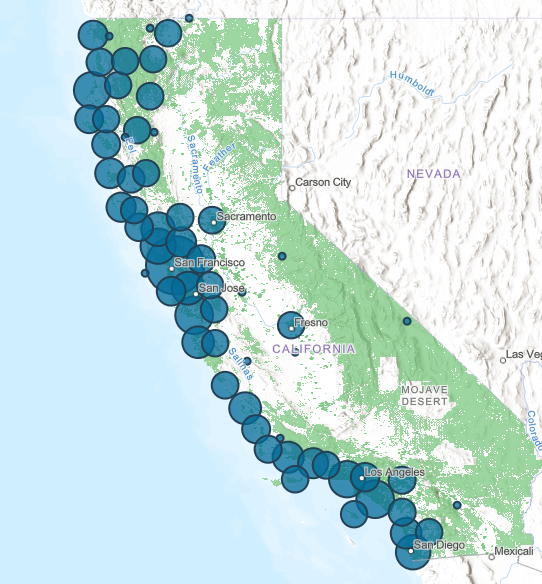
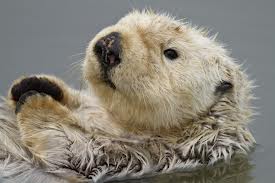 Help Save Sea Otters at Tax Time
Help Save Sea Otters at Tax Time


